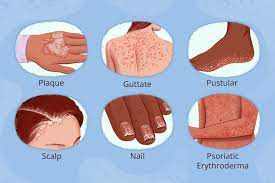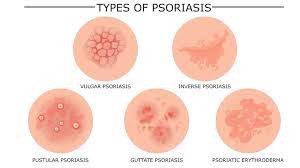Introduction to Psoriasis:
Psoriasis is a chronic autoimmune condition that affects the skin, causing patches of thick, red and scaly skin. while it is primarily a physical condition it can also have a significant impact on mental health.
Studies have Shawn that people who Psoriasis are at a higher risk of developing depression, anxiety and other mental health condition compared to those without the condition. Psoriasis can also interfere with daily activities and social relationships, leading to isolation and feeling for low self-esteem.
The stress associate with chronic condition can also trigger mental health. It is important for people with Psoriasis to prioritize mental health and seek support if needed. This can include talking to mental health professionals, joining a support group practicing stress management technique and engaging in activities that promote relation and self-care.
According to doctor Anthony Fernandes (M.D. PhD) director of Dermatology department, having both Psoriasis and mental health condition is so common. people who are shy to talk about mental illness are more likely to suffer from psoriasis. They may feel embarrassed about sharing their weakness, this often result in people keeping their anxiety and depression themselves, which can lead to psoriasis.
Research out of Denmark, also found at over that course of 5 years, 2.6% of people with psoriasis developed mental health disorders, including depression anxiety and bipolar disorder. Within 10 years almost 5% developed these disorders.
Etiology;-
It is skin disorder that causes in cells to multiply up to 10 times faster than normal. This makes the skin build up into bumpy red, patches covered with white scales. They can grow anywhere but most appear on scalp, elbow, behind ears, knees and lower back.
It could not be passed person to person, because of it is autoimmune condition, it does sometimes happen in members of same family. It is chronic disease. It usually appears in early adulthood in most people, it affects just a few areas, in severe cases it covers large Parts of the body. The patches can heal and then come back throughout a life.

Causes of psoriasis:
- Over consumption of alcohol and smoking
- Stress
- Low immune system
- Hormonal changes in women during one menopause.
Symptoms; –
- Plaques on Red skin,
- Itching and pain over patch,
- In severe cases bleeding may appear,
- Sometimes due to itching, cracks may appear
- Nails may also detach from the nail bed,
- Plaques of scales on the scalp known as scalp psoriasis.
- In some cases, people are suffering from pain and swelling over joints, known as psoriatic arthritis.
Types-
There are many types of Psoriasis no need to know much more.
Two main types are common;

- Pustular – Which causes red and scaly skin with tiny pustules over joints, hands and inguinal or groin region.
2. Scalp -Which causes scaly skin over scalp and behind ears.
Treatment Of psoriasis:
Treatment will be selected based on the size, location, age, stress and overall health.
Common treatment; –
According to modern view,
- Steroid cream
- Moisturizer for dry skin
- Coal tar (lotion, shampoo specially for scalp
- Vitamin D supplement
- Retinoid c
- For itching- anti itching cream because itching may interfere sleep.
- Suggest getting more sunlight
If patients Don’t respond with medicines, then treatment of mental health is essential, because Psoriasis and mental disorders are interlinked.
Mental fitness for Psoriasis; –
- 8 hours of sound sleep, during sleep our body and brain repairs themselves.
2. Exercise is another tool that helps you reduce stress and anxiety, boost our mood and reduce inflammation.
3. Listen to guided meditation.
4. Eat balanced food.
5. Listen to music
6. Take frequent breaks during work and stretch your body that helps reduce stress.
7. practice deep breathing technique before sleep.
Positive Mindset and strong belief system; –
It is scientifically proven that our thoughts and emotions affect directly on our body cell, if we may be holding on to belief that boost anxiety and depression, such as because:” I have Psoriasis, I am ugly, weird or unlovable. rather than we should start to pay attention to the thought running through our mind every day. We should start to adopt healthier and accurate belief, such as: I am a unique human being and I am healthy”. These thoughts will help us to overcome from any diseases.
“Just said what’s going on in mind“
Of course, we are concerned about others’ perception but talk with the mental health professionals. Remember, mental health conditions are common in people with Psoriasis You are not alone. Getting the right treatment can help to change your life.
Ayurvedic view; –
Because of Psoriasis is long lasting condition, people might be interested in trying Ayurvedic medicines. A few studies show Ayurvedic treatment could help people who have psoriasis.
Ayurvedic medicines are based on the idea that everyone is made up of five elements– Air, Earth, Fire, space and Water. These elements combined in the body to form life forces called doshas.
Vatta-combination of space and air
Pitta-combination of fire and water
Kapha-combination of water and earth
According to Ayurveda, Psoriasis result from unbalanced vata and kapha dosha. ayurvedic doctors will create treatment plant based on symptoms and lifestyle.
- Diet changes
2. Add herbs
3.Oil massage
4.Give laxatives
5.Panchakarma treatments such as Virechana and Vaman.
6.Bloodletting therapy.
Conclusion:
According to study, People with disorders are more likely to experience certain mental health conditions than people without psoriasis. Biological and environmental factors associated with psoriasis can lower your quality of life and negatively affect your mental health. To get more insights, read my latest book, the magical ways for sparkling lifestyle.


Leave a Comment